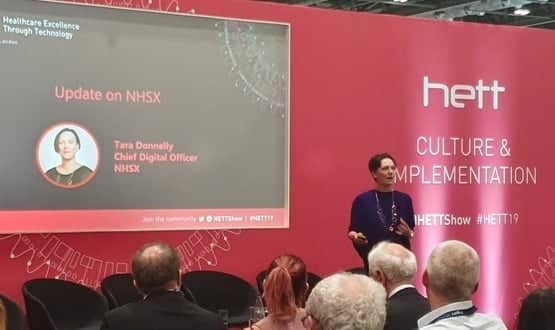NHS needs to be ‘slim and simple’ to allow innovation, Donnelly says
- 2 October 2019

The NHS needs to be “slim and simple” at national level to allow the health technology market to innovate on its platforms, Tara Donnelly has said.
Speaking at HETT on 2 October, the chief digital officer at NHS England and chief digital officer at NSHX spoke about the importance of working with the market to gain the most benefit from digital health solutions.
Speaking about the progress of projects like the NHS App, she said it was a “bells and whistle-free zone” in order to encourage rather than stifle innovation.
“We think that our role in terms of national development is we should be quite slim and quite simple and we should let the market innovate as much as possible,” she said.
“The NHS App and NHS Login, which is how you get through to it, should be opened up to innovators as much as possible.”
She told the audience at ExCel that the main priorities for NHSX, which was officially launched in July, was to improve standards and interoperability.
Improving procurement processes and helping NHS organisations make the most of digital health solutions were also high on the list, based on consultations with NHS organisations and health tech innovators.
“Data has to flow between systems; we can’t be locked in vendor specific data anymore, or we are not going to achieve our ambitions,” she added.
“The standards and tools are really very important.
“A good deal of the work the NHSX leads happens in the field. Substantial amounts of funding is given to parts of the system to lead the way so that others can learn more quickly.”
Her comments echo that of NHSX chief executive Matthew Gould yesterday.
Speaking at HETT on 1 October, Gould said NHSX would focus on providing solid foundations upon which innovators can sell and scale their technologies more quickly, rather than mandating work from the centre.
The issue of scaling, as opposed to a lack of innovation, is the main problem facing NHS digitisation, he argued.
Gould also acknowledged that the NHS “hadn’t made it easy” for health-tech companies to sell into the system and scale across it.
“We haven’t always been great as the NHS at identifying for the market what it is we need and what it is our patients need, and articulating that in a way that’s helpful,” said Gould.
“Technology that meets the user need…isn’t necessarily the technology that innovators come up with, or want to sell.”





1 Comments
I disagree with Tara ! innovation will originate from the NHS provider level, certainly not @ the national level, put the innovation in the market and let them battle it out. Innovation will NOT come from the non NHS arena, the non NHS arena is best placed to bring innovation to market in an efficient way,
Comments are closed.